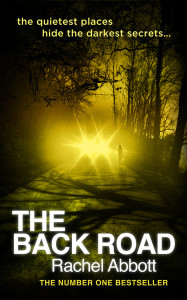One of the things I love about the author community these days is the authenticity around sharing, and the generosity in helping others.
 Blogging and social networks enable writers to finally find a community online, and I am so grateful that this site continues to be a place we can share honestly and with support for each other. Today I?m excited to welcome Rachel Abbott, Amazon #1 bestselling author of Only The Innocent and now The Back Road, to talk about some of her writing challenges when going deeper into characters.
Blogging and social networks enable writers to finally find a community online, and I am so grateful that this site continues to be a place we can share honestly and with support for each other. Today I?m excited to welcome Rachel Abbott, Amazon #1 bestselling author of Only The Innocent and now The Back Road, to talk about some of her writing challenges when going deeper into characters.
You can also check out an audio interview with Rachel here, on marketing your way to a #1 bestseller.
I?ve always been a writer of one sort or another, but until four years ago my experience had been in writing creative treatments, plots for interactive programs or even board reports ? none of which generally require significant emotional input. It?s hard to shed a tear over a flowchart ? although sometimes it might want to make you scream with frustration.
When I wrote my first novel ? Only the Innocent ? I wrote for my own pleasure.
I never expected anybody to read it ? not even family. But I was pressurized into sharing it, and I realized that if I was going to allow people to actually read it, I wanted to make sure that it was at least half decent. I was happy with the story, but I wasn?t convinced about the quality of the writing, and nobody was going to be allowed near it until I was. Of course, this was before I realized that you can?t just learn to write, like you might learn to recite the alphabet ? it is forever a work in progress and an endless learning curve. Nonetheless, I took my fragile ego in both hands and paid to have my book torn apart by an expert.
In the end, the feedback wasn?t too bad considering it was my first attempt. However, it was full of phrases that I didn?t understand.
Apparently my biggest sin was ?head-hopping?.
What?
On Point of View
I hadn?t the faintest idea what this was about, so I turned to Google and read every possible article I could find until it was ingrained in me. I was told that I was writing as if I were watching a film, sitting in an armchair. Where I should have been was inside the head of one of the characters ? the person whose point of view the scene was written from. That person?s eyes needed to become my camera.
It took a while, but I got there in the end. I now make sure that every scene of every chapter is clearly marked in the draft with exactly whose POV the scene is viewed from in capital letters so I can?t forget.
If you are as ignorant as I was about this, a classic example of head-hopping would be:
?Nick dragged his gaze away from the road ahead and looked at Laura. Her eyes were heavy with unshed tears as she stared out of the window. But Laura didn?t see his glance. She was watching the dark brooding clouds, and thinking how well they matched her mood.?
First we?re seeing the scene from Nick?s perspective, and then suddenly we know what Laura is thinking. If your camera is inside the character?s head, you?ve just switched seats!
Now I know that this is quite basic stuff and you probably all got this long ago, but when you really do get inside a character?s head it can make you go slightly loopy. You have to start thinking what your character would think, feel what they would feel. You might want to see, hear and even smell their surroundings ? just as they would do. So how do you describe what somebody is feeling?
There are two perspectives here. Let?s imagine there are two people in a room. Ellie and Leo (short for Leonora). These are two characters from my latest novel, The Back Road. Ellie is furious, and Leo is watching her. If you are in Leo?s head, you have to describe how that fury looks to you. If you are in Ellie?s head, you have to describe how the fury actually feels.
On Adverbs
I thought the first one was easy, but I was wrong ? as I discovered when I read a book on self-editing and was told that under no circumstances should adverbs be used. ?Words ending in LY should be eradicated from your writing,? it said.
Why? I thought, angrily. (There you go!! An adverb.)
I?d heard of the ?show don?t tell? advice, but didn?t really get it until the whole adverb issue was pointed out. I searched my novel. Uh oh ? there were lots of adverbs. So now not only did I have to start thinking about whose head I was in, I had to think about how they would ?see? people?s actions. I started to look into body language and descriptions of facial expressions. If I can?t say ?angrily? ? what would this person be looking like, or how would they be holding their body?
Whereas once I might have said ?Ellie turned angrily to Leo,? I now had to think what an angry turn looks like. How would Ellie be feeling, and how would that portray itself in her actions?
?Ellie slammed the glass down on the worktop and spun round to face Leo.? Now I don?t need to be told she?s angry. I can see it for myself.
But to get to that point, I had to get inside Ellie?s head (even though at this point I was viewing the scene from Leo?s POV ? just to confuse you) so that I could work out exactly how she would demonstrate her fury. Then I had to stand on the other side of the room and see it enacted through Leo?s eyes.
So I?ve experienced the rage, but now I am in calm place ? all in a matter of seconds ? witnessing this anger portrayed by another person. Now do you understand the ?loopy? comment?
All of this helps me enormously with describing a person?s demeanor without resorting to adverbs, but what about when I am describing the emotion from within that person. If that scene had been from Ellie?s point of view, I would have had to describe how she was feeling. It somehow didn?t feel good enough to say something like ?Ellie felt a ball of anger bubble up inside her,? because that didn?t really explain the raw emotion.
I needed to dig deeper.
There were a couple of points in my latest novel where I came unstuck. In both cases I was writing a scene from the point of view of the person who was experiencing the trauma, and so I had to find words to express how she felt. I couldn?t say ?She sat disconsolately on the bed? ? I had to really think how to describe what ?disconsolately? would feel like (and anyway, it was an adverb!).
On one occasion I wrote something like ?Ellie wondered why was it so difficult to describe emotional pain,? to which my editor responded in large letters on the side of my manuscript ? ?it?s not Ellie who can?t describe it ? it?s you!?.
Oops.
How right she was. But emotional pain is so very difficult to describe, and it?s not something that one wants to experience on a regular basis. So I had to dig deep down inside myself to think of something that had hurt me badly, and imagine it all over again so that I knew how it felt. That was a harrowing and distressing moment, but I?ve found myself doing it more and more often.
The second occasion was when I needed to describe fear. I?m not very often in situations where I?m afraid, I?m happy to say. I live on an island where nobody ever locks their doors when they go out, and crime is zero. But as luck would have it, one day I?d been out ? leaving the door unlocked ? and I came home just as it was getting dark. I was alone.
Then, from upstairs, I heard a thud.
It wasn?t subtle ? and it was definitely in my house. I felt as if I a million tiny pins were pricking every inch of my body. It only lasted a second, but it was the first time I had bothered to even think what fear felt like. I was more interested in my reaction to that moment of fear than I was in what was going on upstairs in my house. I forgot about my burglar for a moment while I imagined the words I would use to describe my physical reaction.
Hopefully the title of this blog now makes perfect sense.
Since starting to write about people and the sometimes terrible situations in which they find themselves, I have had to explore emotions in a way that I have never done before.
I?ve had to interpret those feelings and put them into words ? and they have to be words that will affect my readers and show them what each character is feeling. I am constantly examining how I react to events so that I can find the words to express each and every sentiment when the need arises, and the days of controlling my emotions to give an aura of outward calm have long gone.
So if you see somebody sobbing in the corner, scribbling in a black notebook, that?ll be me!
P.S. The loud thump from upstairs was a mirror falling off the wall (it didn?t break).
 What are the challenges you have in writing emotion, or point of view? Please share your comments and tips below.
What are the challenges you have in writing emotion, or point of view? Please share your comments and tips below.
Rachel Abbott?s second novel The Back Road is available now on Amazon for ?1.99. It will be released later this year in other formats in the UK, and in paperback and Kindle versions in the US.
You can find Rachel at Rachel-Abbott.com and on twitter @_rachelabbott
Top image: Flickr Creative Commons shipwreck by palestrina55
Source: http://www.thecreativepenn.com/2013/04/28/writing-emotional-wreck/
prince johan friso windows 8 logo anguilla gone with the wind checkers imbibe msg network
No comments:
Post a Comment
Note: Only a member of this blog may post a comment.